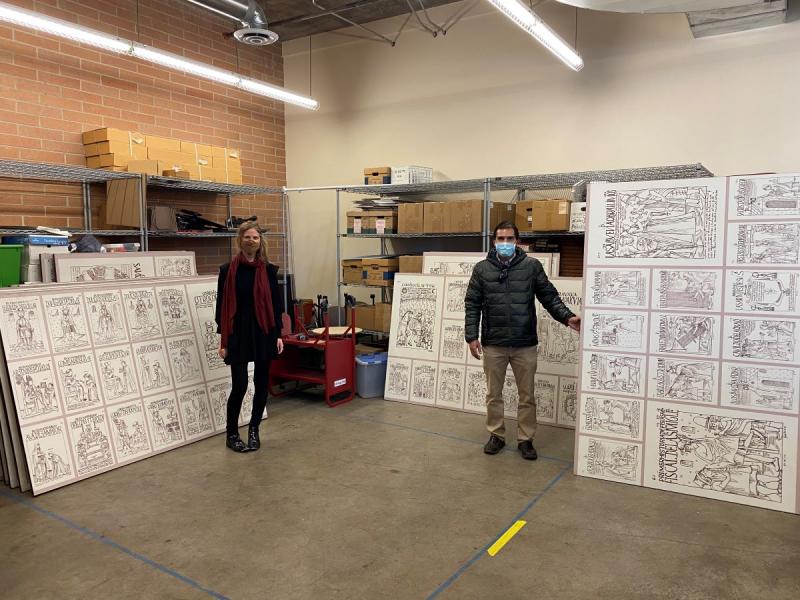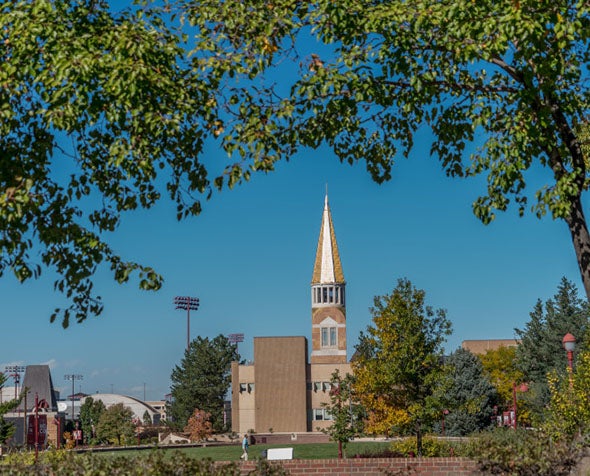Quechua Language Panel Donation Brings Together Students, Libraries, Community

Associate Professor Alison Krögel stands with Roland Denegri Aguirre, Consul General of Perú in Denver, Colorado, as Denegri Aguirre delivers the Guaman Poma de Ayala panels to the University of Denver in February 2021.
The Peruvian Consulate of Denver recently donated 32 panels to the University of Denver. The panels, written in Quechua and Spanish, reproduce manuscript drawings by Indigenous chronicler Felipe Guaman Poma de Ayala.
“The power of [Guaman Poma’s] chronicle in both denouncing and bearing witness to colonial-era abuses while also celebrating the beauty, creativity and resiliency of Indigenous Andean cultures is amplified when one views the images in person and in a large-scale representation,” Associate Professor of Spanish Alison Krögel says.
This donation emerged from partnerships forged between Krögel, who specializes in Andean & Quechua literary and cultural studies in the Department of Spanish Language, Literary & Cultural Studies, and the Peruvian Consulate of Denver. In 2019, the Peruvian Consulate invited Krögel to give a lecture in Spanish and Quechua for the gallery opening of the exhibition of Guaman Poma’s panels at Denver’s Museo de las Américas.
Inspired by the over 250 community members who gathered at the event, Krögel applied for and received a CCESL Community Engaged Teaching Project Mini-grant, which allowed her to develop community-engaged learning partnerships with the Peruvian Consulate in two of her courses. In these community-engaged learning projects, her students researched issues facing Peruvian sheepherders working in Colorado and other Rocky Mountain states and helped develop Quechua-language materials for the Peruvian Consulate to distribute virtually to their Denver community.
This donation joins a few other Quechua language materials that are available at DU’s University Libraries, acquisitions facilitated by reference librarian and professor Peggy Keeran. Since 2018, Keeran has worked with Krögel to acquire a series of Quechua language literature and poetry texts published by a premier Andean and Quechua Studies press, Pakarina Ediciones, in Lima, Peru.
For Keeran, these acquisitions, including the recent donation of these 32 panels, are an important part of her commitment to acquiring non-English language materials and making those available to the DU community and other communities throughout the region. The Quechua language literature and poetry texts are available through the Prospector and Interlibrary Loan systems, which allow patrons from Colorado and across the country to request and read these materials.
Some of the Guaman Poma panels will become part of permanent displays in the Department of Spanish Language, Literary & Cultural Studies and perhaps other locations on campus, and all 32 will make an important contribution to the University of Denver Special Collections & Archives, led by curator and associate professor Kate Crowe. According to Crowe, of the languages present in DU’s archives and special collections, English language collections make up close to 95% of the collections (1,069 collections out of 1,109 total). This donation of panels with the art of Guaman Poma will contribute to a small and growing collection of non-English language works, efforts built into collections like the Fine Press and Artists’ Books Collection and part of a larger acquisition goal for the librarians at DU.
Krögel sees these panels as an important resource not only for her students, but also for the Peruvian, Latin American and Quechua-speaking communities of Denver and Aurora. While digital versions of Guaman Poma’s work are available through the Royal Library of Denmark, these physical reproductions offer different modes of access.
“Viewing these large-scale reproductions of the images from the historical chronicle allows one to pay closer attention to Guaman Poma’s visual composition choices, the moving (and at times humorous) ways in which he integrates Quechua language dialogue or descriptive text into his drawings when he wants to denounce a particularly grave offense committed by the Spanish colonizers against indigenous Andeans,” Krögel says.
In the future, Krögel, Keeran and Crowe hope to make some of these Quechua language materials accessible and available digitally, as well as cultivate additional partnerships with other university and community organizations, to highlight the presence and availability of these Quechua language materials. When people are able to safely gather again, Krögel hopes these panels can be shared at events to create continuing community partnerships between the University of Denver, the Peruvian Consulate of Denver, and the Quechua speaking community of Colorado, Wyoming and Utah.





